Japan’s Nippon Paper plans to mass produce Nano fibre products that are five times stronger than steel yet super light

Many Japanese companies now operating in the paper industry are being lured by the commercial potential of nano fibre technology and are keen to commercialise it in mass markets.
Nano fibre is five times stronger than steel yet very lightweight and is made from wood and fruit fibres. Japan expects the market size of nano fibres to reach 1 trillion yen (AU$11.3 billion) by 2030, according to stats from the Japan’s trade ministry.
Falling demand for paper
Recent media reports have said Japan’s top paper maker Nippon Paper Industries (TYO: 3863) is getting ready to open an exclusive factory to mass produce nano fibres in 2016. This is part of Nippon’s effort to bolster revenue and safeguard the company’s future prospects as its core product paper is under low demand and facing threats from a shrinking population and the rapid shift to online content. The sale of newspapers and books are down.
“We are pinning our hopes on the material as our biggest growth potential,” said Masayuki Kawasaki, head of Nippon Paper’s cellulose nano-fibre business promotion, reports Bloomberg.
Yet another Japan company, Mitsubishi Pencil Co has already released the world’s first commercial nano fibre product--a $2 pen that is now being sold successfully in the United States.
First plant
The capacity of Nippon's proposed nano fibre plant would be 10 times higher than the pilot plant, already being run by Nippon in Iwakuni, that is producing 30 metric tons of the material a year, Kawasaki said. The Iwakuni plant moved to full capacity after its product--Nippon’s adult diapers, made remarkable sales after its launch on Oct. 1.
In the new facility, Nippon Paper would produce more diapers and expand into food, cosmetics and packaged products. The annual sales of products made of plant fibers would be several billions of dollars in the next 15 years, the Nippon official said.
The outstanding properties of cellulose nano fibre testify its strength, which is five times higher than steel though it is light weight, with just one-fifth the weight of steel. Nano fibres will also never run short of supply as they are derived from common place organic materials like wood or orange peel that are environmentally friendly. The applications of nano fibres are also unlimited and range from slowing the melting of ice cream to making screens of smart phones and even replacing the steel in car bodies.
To popularise the Japanese technology on nano-fibres Nippon Paper will also build a prototype car, fully made of cellulose nano fibre, and it will be unveiled at the 2020 Tokyo Olympics, according to Kawasaki.
Nippon draws 80 percent of its sales from pulp and paper and is among the top-two manufacturers in paper industry with Oji Holdings Corp being the other player.
Technology
Nano fibre products hold a great future as developed countries are seeking out ways to curb carbon emissions. Japan has understood the merit of commercial development nano fibre than pursuing production of metals and alloys that require tons of fossil fuels for mining, transport and processing, notes a report Chicago Tribune quoting a Bloomberg story. The steel industry already accounts for about 40 percent of industry emissions.
“Cellulose nanofiber itself could be an ace-in-the-hole for Japan's industry,” noted Hiroyuki Okaseri, a senior pulp and paper analyst at SMBC Nikko Securities Inc. in Tokyo.
For feedback/comments, contact the writer at feedback@ibtimes.com.au or let us know what you think below.





















